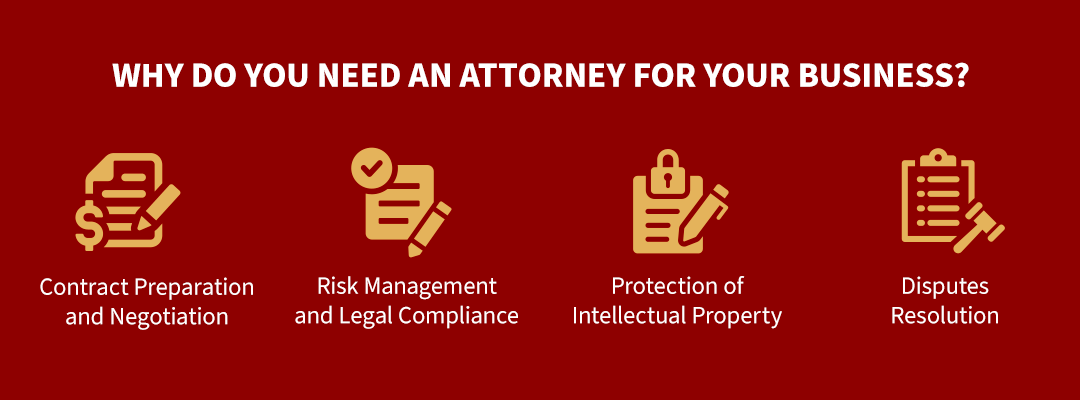What questions should you ask when choosing a business lawyer? Should you focus on experience and track record alone, or are there other qualities to consider? Selecting an attorney for your business is an important decision, so we have prepared this guide to help you. You will learn why you need a business lawyer and seven crucial factors to take into account.
Calabrese Law Associates supports small to large businesses in the Greater Boston Area, providing quality legal solutions. Reach out to speak to a business lawyer, or read on to learn more.
Why Do You Need an Attorney for Your Business?
Business attorneys provide ongoing support to entrepreneurs, investors, and business owners. Besides being precautionary, most modern businesses and individuals consider this partnership as a strategic approach to driving growth. Lawyers can provide helpful insights that direct the company toward its goals:
1. Contract Preparation and Negotiation
Contracts are the backbone of business operations. They govern transactions between parties by establishing the terms of engagement and serve as evidence of agreements. The challenge is that contracts can be technical, so business owners hire attorneys to perform tasks like drafting, review, and negotiations.
Business lawyers understand the nuances of contract law. They can identify potential pitfalls that most people may overlook. Again, they can ensure the terms are clear, enforceable, and favorable to your business. This scrutiny helps protect client interests and mitigates risks.
2. Risk Management and Legal Compliance
Business operations generally require adherence to regulations. These laws can be complex and comprehensive, primarily when you operate in the real estate, construction, or private investment markets. To navigate this challenge, business owners partner with attorneys with practical industry experience.
Attorneys can identify potential risks and advise on best practices to mitigate them. They can ensure compliance with federal, state, and local laws, particularly those designed for specific industries. With an attorney’s assistance, you can also develop internal policies that align with legal standards. This strategy reduces statutory sanctions such as fines and can also prevent lawsuits.
3. Protection of Intellectual Property
In today’s competitive market, protecting intellectual property (IP) rights is vital. Whether it’s copyright, patents, or trademarks, an attorney with knowledge of IP laws can help safeguard valuable assets. IP lawyers can help you file for IP protection to legally recognize your innovations and protect them against infringements. They can also protect your interests when someone violates your IP rights. This proactive approach secures your creations and enhances brand value in the marketplace.
4. Disputes Resolution
Disputes are inevitable in business. Whether they arise with clients, suppliers, employees, or competitors, it is best to have a lawyer on your side when the time comes. Lawyers can develop practical approaches to handling such situations. Is litigation necessary, or can the parties resolve the disputes amicably? The answer depends on the situation.
Business lawyers can determine which alternative will produce the best possible outcome, considering factors like cost and time. They can also provide legal representation during litigation, mediation, or arbitration disputes.
How to Choose an Attorney for Your Business
Now that you understand the value lawyers bring to businesses, let’s examine how to choose one. Below are seven considerations when choosing a business attorney:
1. Legal Qualification and Experience
Before choosing a business lawyer, check their education and qualifications to ensure they are admitted to practice in your state. Second, verify how long the lawyer has practiced, as experience is crucial in the industry. Third, what cases or matters has the lawyer handled, and what is their success rate? These considerations give you an insight into the lawyer’s competencies.
2. Practice Areas
Check the lawyer’s practice areas as part of the background research. Business law encompasses various fields, including contract law, construction and real estate, private investment, corporate governance, and business formation and dissolution. Each field may require focused knowledge, and selecting an attorney who is well-versed in your industry is ideal for getting tailored advice.
The type or size of your business can also influence the kind of lawyer you need. Are you a startup or an established company? What is your employee structure? Do you have offices or branches in other states? These are examples of questions you can use as guidance.
3. Local Knowledge
Local knowledge is vital when choosing which law firm or lawyer to partner with. Sometimes, lawyers who understand the state and local business laws and regulations are best as they can provide contextualized and direct advice. Also, lawyers who are familiar with local businesses and connections can bring added value. In the event of litigation, a business attorney with knowledge of the local court systems can be pivotal in your success.
4. Reputation and References
Researching the attorney’s reputation is crucial when deciding. You want to partner with a law firm or lawyer who is highly respected in the industry, considering who you choose can impact your brand. Among other things, confirm whether the attorney has any ethical issues and how they have handled previous cases. Again, engage the lawyer to assess whether they have a genuine interest in helping you.
5. Communication Style and Responsiveness
Effective communication is important in any attorney-client relationship. Thus, when evaluating potential attorneys, pay attention to their communication style and responsiveness. You want someone who listens to your concerns carefully. They should also be able to explain legal concepts clearly, respond to calls and emails quickly, and provide regular progress updates on cases and transactions. The ideal candidate will find time to address your needs.
6. Client Relationships
Client relationships are essential in the legal industry. You want a lawyer who does not treat you and your business merely as a case or transaction. The lawyer should understand your needs and aspirations and be capable of helping you achieve your goals. Moreover, you need someone with a good balance between professionalism and interpersonal skills.
You can assess these traits through client testimonials and reviews. Client feedback is essential because it gives you insight into the attorney’s competence, reliability, and real-world experience and outcomes. It is best to partner with an attorney you can build a long-term professional relationship with.
7. Fee Structure and Affordability
Lawyers have different fee structures depending on the type of case and practice. For example, a lawyer may charge a fixed or hourly rate for consultancy, contract work, or legal representation. They may also charge a percentage of the transaction value or damages awarded for contracts and litigation, respectively. Business owners who need ongoing support may also agree on a retainer with the lawyer. It is vital to determine which fee structure best suits your needs.
Finally, ensure the fee falls within your budget. Instead of choosing the most affordable option, consider the one that can provide the highest return on investment (ROI). Your goal should be to partner with a lawyer who brings the most value to your business.
Why Trust Us?
Calabrese Law Associates is a renowned law firm in Massachusetts. We provide practical legal solutions to businesses and individuals, helping them make informed decisions. We have years of practical experience and deep knowledge of state and local laws. Our attorneys have handled complex cases, so you know you are in good hands.
Our guiding principles include providing excellent legal services to our clients. We are highly efficient and develop tailored strategies to achieve the best possible outcome. We understand that each case or engagement is unique.
Our approach to service delivery and results have earned us multiple awards and recognitions. Most importantly, we have longstanding relationships with most of our clients and a close connection with the community. Our goal is simple — helping businesses and individuals grow through effective legal assistance.
Calabrese Law Associates: Your Business Law Partner
Do you need a business lawyer with practical experience in areas like construction, real estate, private investment, corporate governance, business formation, and dissolution? Perhaps you need assistance with contract drafting, review, negotiation, or business litigation. Calabrese Law Associates is here to help.
Our business lawyers will listen to you and help you find solutions to your legal issues. Contact us today to speak to one of our trusted professionals.
This publication and its contents are not to be construed as legal advice nor a recommendation to you as to how to proceed. Please consult with a local licensed attorney directly before taking any action that could have legal consequences. This publication and its content do not create an attorney-client relationship and are being provided for general informational purposes only.
Attorney Advertising. Prior results do not guarantee a similar outcome.





